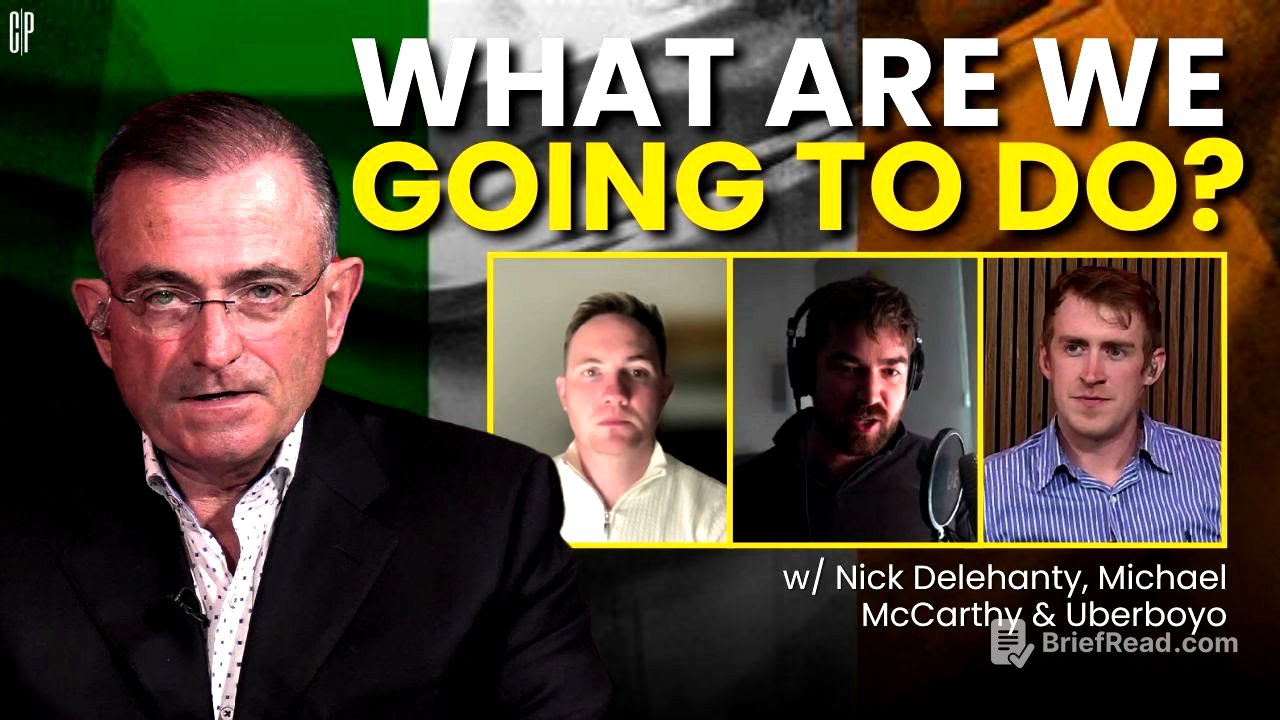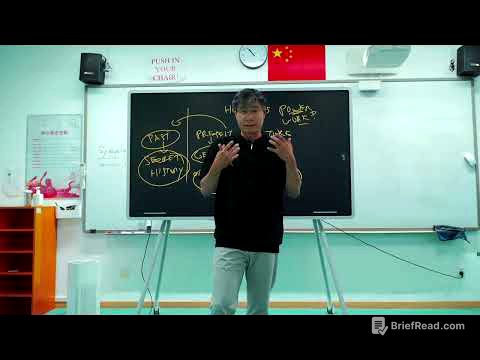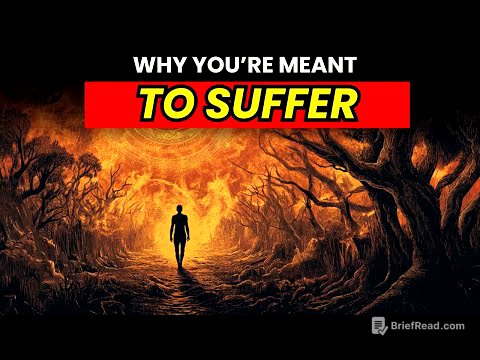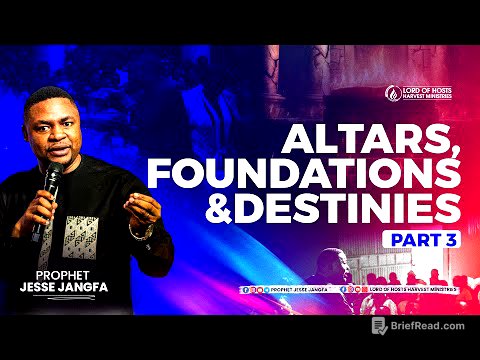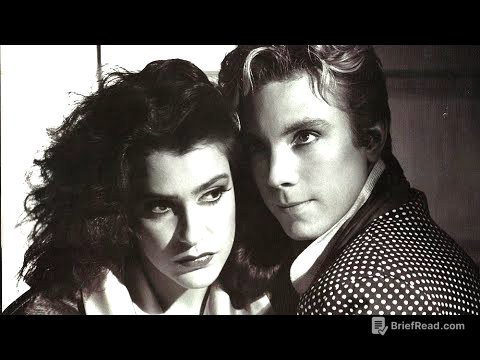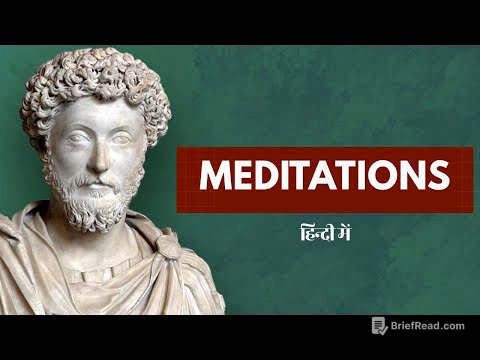TLDR;
This inaugural edition of Counterpoint discusses the pressing issue of migration in Ireland, the role of international organizations like the IOM, and the domestic industry that has emerged around accommodating migrants. The panel explores the economic arguments for and against migration, the potential impact on Irish culture and society, and the political disconnect between the government and the people. They also touch on the influence of global entities like the World Economic Forum and the EU, and the need for a shift towards prioritizing the interests of the Irish people.
- Migration trends and concerns in Ireland.
- The role and influence of international organizations and NGOs.
- Economic and cultural impacts of migration.
- Political disconnect and the need for grassroots engagement.
- Potential solutions and the importance of national identity.
Introduction to Counterpoint and the Migration Issue [0:00]
Eddie Hobbs introduces the guests and the main topic: migration in Ireland. Over the past five years, approximately 520,000 people have entered the country, with about 182,000 being refugees and asylum seekers. Among these, around 72,000 are asylum seekers and refugees, with concerns that many are economic migrants. Gardaí are reportedly concerned about the lack of intelligence regarding who is entering the country. The International Organization for Migration (IOM), part of the UN with a substantial budget, is involved in promoting immigration, raising questions about the scale and influence of the "migration industry".
Domestic Industry and the Cost to Taxpayers [4:42]
Nick Dalahanti discusses his investigations into the domestic industry surrounding iPass centers, particularly in Monaghan and other border counties. He highlights that well-connected families and high-profile GAA personalities are profiting significantly from this. Dalahanti focuses on the financial aspect, emphasizing the high cost to taxpayers, especially when childcare costs in Ireland are among the highest globally. He criticizes the political class for being afraid to discuss these issues openly, referencing the cancellation of a discussion at UCD titled "Is Ireland Safe?".
EU Migration Pact and Replacement Migration [7:48]
Uber Boy discusses the EU migration pact and how Irish TDs voted to join it despite public opposition. He attributes this to greed and financial incentives, with many property owners profiting from contracts related to migration. Uber Boy argues that there is a deliberate project to encourage migration, citing documents from Project Syndicate and declarations from the UN about the need to replace populations due to declining birth rates. He draws a parallel to historical crusades, suggesting that current policies are driven by a need to maintain GDP through replacement migration.
Economic Arguments and the Quality of Migration [12:29]
Michael McCarthy questions the economic arguments for migration, especially with the rise of AI and robotics. He points out that the quality of migration is negatively impacting countries like Sweden and Germany. McCarthy cites statistics about the growing Islamic population in France and the demographic changes in Brussels. He distinguishes between high-quality migrants and those who may become a burden on the social welfare system.
The Irish and Danish Models Compared [14:46]
Eddie Hobbs compares the Irish model of handling migration to the Danish model, noting the stark differences. Ireland is taking in people without knowing who they are, from countries with no affinity, and without clear economic reasons. This is happening while Irish families struggle to access benefits and housing. McCarthy adds that low-skilled non-EU migrants often drain the economy, costing the state significant amounts over their lifetime.
Boycotting Profiteers and the Immigration Industrial Complex [16:46]
Nick Dalahanti notes that people are starting to boycott businesses profiting from iPass centers. He describes the situation as an "immigration industrial complex," where everything is incentivized to encourage the establishment of these centers. Dalahanti mentions the emergence of a billionaire iPass center owner in the UK. He also highlights that some European countries, like the Netherlands, are seeking to opt out of the EU migration pact, signaling a potential shift in attitudes.
Deportation and Changing Political Rhetoric [20:17]
Dalahanti suggests that mass deportations are not effective and can be dangerous, advocating for voluntary deportations and cutting off welfare to incentivize people to leave. He emphasizes the need to stop the influx of migrants and cut spending on iPass centers. Hobbs points out the EU's push for hate speech bills, which could stifle accurate reporting and free speech. Uber Boy notes that despite a rise in populist energy, political action may not follow, as seen in the UK's history of ignoring public opinion on migration.
Nationalism, Self-Love, and State Purpose [23:38]
Uber Boy argues that the key issue is the lack of "self-love" within the Irish state, contrasting it with Dubai and Singapore, where the state's purpose is to serve its people. He criticizes the "anti-white propaganda" and self-hate that undermine the native population. Hobbs describes the Irish government as a "Vichy government," implementing policies dictated by global entities like the World Economic Forum, which promotes stakeholder capitalism over representative democracy.
Social Media Engagement and Waking People Up [28:30]
Hobbs emphasizes the importance of social media engagement and rallies to wake people up to the issues. Uber Boy reiterates that a total migration plan should serve the state, and the absence of this in Ireland is causing chaos. He stresses the need for a psychological shift to prioritize the interests of the Irish people. Hobbs highlights the handing over of borders to unelected bureaucrats in Brussels and the corporate investments driving the iPass center industry.
The Role of Media and Public Awareness [31:42]
Michael McCarthy discusses the positive reaction to his video clips, noting that many people feel validated and less alone in their views. He shares his background in construction and sales, explaining that his frustration with the lack of media presence on these issues motivated him to start creating content. Dalahanti criticizes the desertion of the Irish people by the media, which has become more like propaganda. He praises social media platforms for allowing free expression and enabling independent voices to reach a wider audience.
COVID-19 and Media Entrenchment [34:35]
Dalahanti reflects on how COVID-19 served as a wake-up call, exposing the entrenched nature of the Irish media and the control exerted by certain political parties over outlets like RTÉ. He contrasts this with the freedom of expression on platforms like X (formerly Twitter). Hobbs criticizes the media for engaging in a cover-up regarding the origins of the pandemic and the involvement of US agencies in bioweapons research.
Final Thoughts and Calls to Action [38:10]
Uber Boy reiterates that coordinated global projects define the lives of the political elite, who often serve larger goals rather than the interests of the Irish nation. He contrasts this with nationalist projects like Dubai, where the elite align with their people. Dalahanti suggests raising the bar for citizenship and praises Denmark's competent government and strict immigration laws. He calls for a focus on competent governance and encourages viewers to educate those around them about these issues. McCarthy notes a positive shift in public opinion, with more people expressing concerns about immigration. He attributes this to the work of independent voices and the impact of events like the Trump movement in America.
